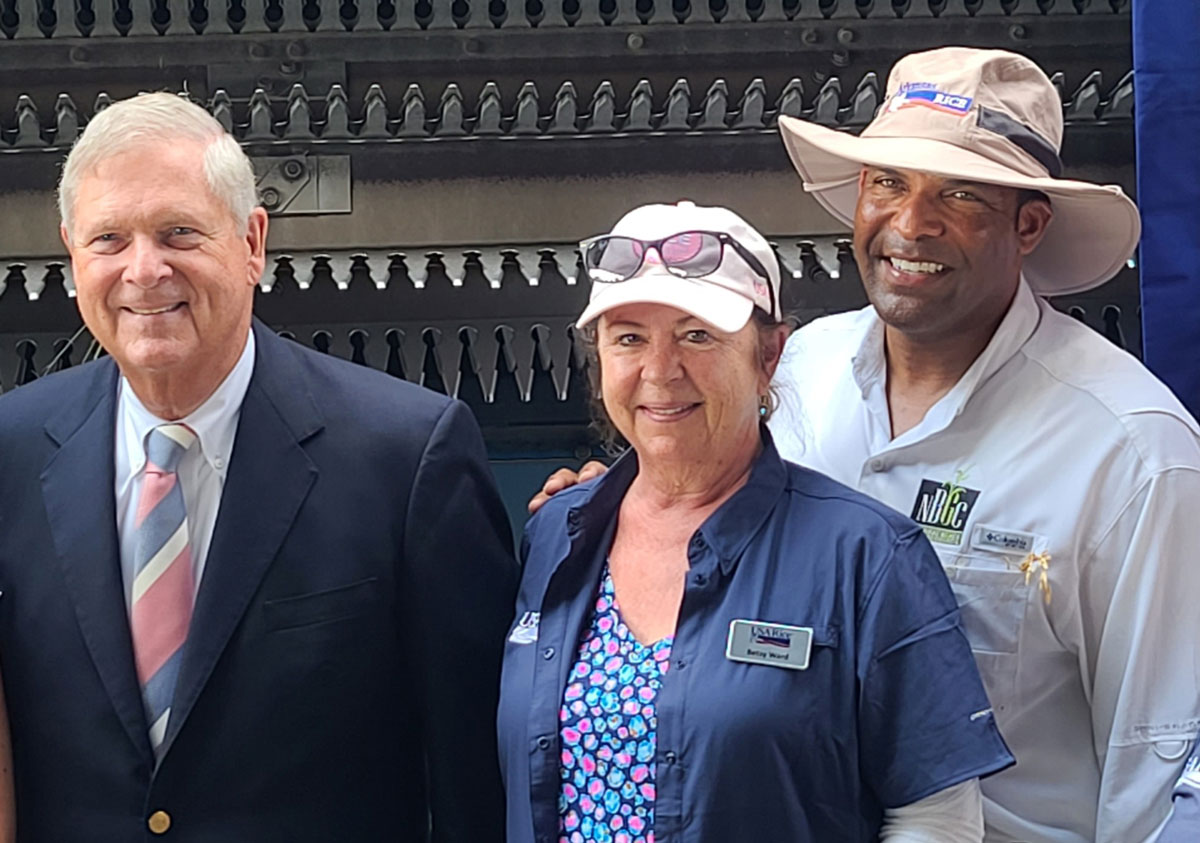 Secretary Vilsack, USA Rice President & CEO Betsy Ward, and Chair of the National Black Growers Council PJ Haynie III
Secretary Vilsack, USA Rice President & CEO Betsy Ward, and Chair of the National Black Growers Council PJ Haynie III
Sep 16, 2022
ENGLAND, AR – Secretary of Agriculture Tom Vilsack, at a panel discussion here today at Isbell Farms, said there’s been an emerging question from consumers he wanted his agency to address.
“Consumers are increasingly asking, ‘is my consumer dollar supporting climate smart commodities? Am I helping or hurting the environment?’,” Vilsack said. “As an agency, we can help create a value-added commodity and that’s what is behind the Climate-Smart Agriculture Commodity Program. We received more than 1,050 applications requesting a total of $20 billion, though originally only $1 billion was available. The USA Rice project scored the highest of all applicants.”
Vilsack said he was able to allocate an additional $2.5 billion to the program and then asked panel participants to explain their proposals.
Rice farmer Mark Isbell explained that the $80 million USA Rice project was a collaboration with Ducks Unlimited and the National Black Growers Council to promote climate smart practices amongst rice farmers.
“Our program is built on a solid history of rice and conservation stewardship efforts that has created an infrastructure to make this new program successful,” Isbell said. “We’ll impact 400,000 acres to enable growers to improve air, water, and soil quality that will reduce greenhouse gases and make a substantial impact on the environment in the future.”
“Rice growers are essential for North America’s waterfowl,” said Dr. Scott Manley, Ducks Unlimited Director of Conservation Programs. “Rice farmers manage approximately 750,000 acres of winter-flooded habitats each year, providing 35 percent of food waterfowl need during the migration season. The support offered through the Climate-Smart Commodities grant will help us continue critical crop and habitat work to ensure support for wildlife.”
Isbell said 25 percent of the program will be specifically targeted to traditionally underserved farm communities.
“There are many growers who have experienced historic inequities that have impacted their ability to establish base acres, or limited their access to capital, both of which you need to be successful,” Isbell said. “We need to fix that.”
Isbell also addressed the market part of the equation.
“The market for climate smart commodities has developed slower than the practices, so we need to take some of this funding and direct it to help enhance the market so growers can benefit from the added value they are putting into their crops,” he said. “We also need to ensure consumer packaged goods companies don’t see this USDA support as taking care of growers completely. We need to ensure an equitable distribution down the value chain to ensure overall success.”
“The National Black Growers Council is excited about our partnership with USA Rice, the universities, Ducks Unlimited, and others,” said PJ Haynie III, Arkansas rice farmer and chair of the National Black Growers Council. “USDA is playing a major role here and we appreciate their willingness to look through the lens of historical inequities Mark addressed.”
Other grant recipients on the panel included representatives of Winrock International that is partnering with Riceland Foods on a project and Tyson Foods that is looking at improving climate smart practices in the poultry, beef, and feed supply chain.
Vilsack said he believes the programs that have been funded will be the equivalent of removing 50 million metric tons of C02 from the atmosphere.
USA Rice President & CEO Betsy Ward, who met privately with Secretary Vilsack before the public event, thanked him for his support with the Climate-Smart Program and recently announced domestic food aid purchases of rice.
Isbell also took the opportunity to point out to the Secretary that ag, and rice in particular, continue to struggle as a result of high input costs, the higher-than-most cost of production for rice, and artificially depressed prices.
“Climate-Smart practices are great, but if we aren’t farming, they won’t help,” he said.
All of the speakers also thanked and recognized the hundreds of USDA employees across the country within the various departments, many of whom were in the audience of more than 200 gathered here today.